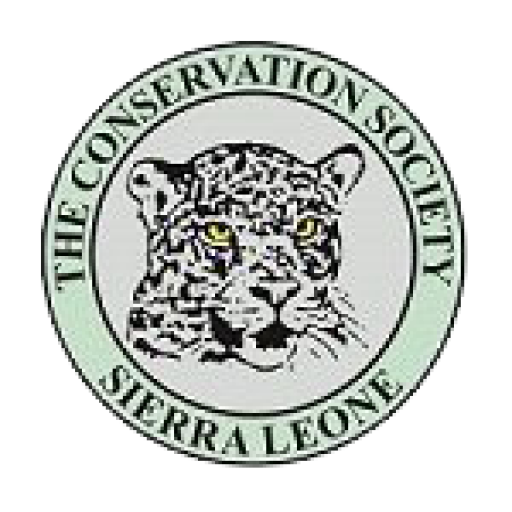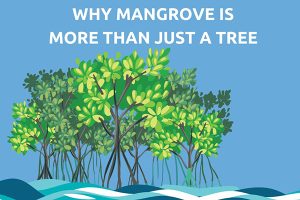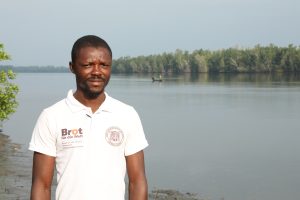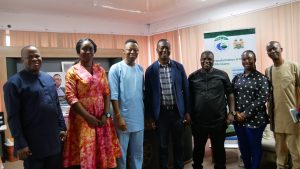Yawri Bay is known for being a home to several ecosystem types, and accounts for 14.3% of the total mangrove swamp in Sierra Leone. Its landscape and location protect it from the force of river and strong marine currents. It is therefore, a suitable spawning and nursery ground for fish, which is one of the country’s most important marine resources. The bay is one of the most important stop-over and wintering grounds for birds in West Africa.
This Important Bird Area is however being subjected to devastating anthropogenic activities including unsustainable fishing, sand mining and massive mangrove deforestation with little or no legal restriction from law enforcement institutions. From extensive field observations made, well over 10,000 hectares of mangroves are estimated to have been deforested and left bare at the bay. This is much to the risk of exposing the entire bay and its human population to harsh climate change effects and health consequences. This highlights the dire need for sustainable alternative livelihood strategies and increased capacity building for local communities to enable them to mitigate climate change effects, especially in reducing the current spate of mangrove cutting.
The Conservation Society of Sierra Leone (CSSL), in collaboration with Green Life West Africa, therefore received funding support from BNCFF (Blue Natural Capital Financing Facility) through IUCN to implement a “Community-based Mangrove Restoration” project at the Yawri Bay in Sierra Leone. The project focuses on mangrove conservation and restoration to address resource depletion from overfishing and deforestation. It will target 50 hectares of degraded area within the Marine Protected Area, and aims to support communities with alternative livelihood options, improve biodiversity, and boost tourism potential for 80,000 coastal residents.
On 7th February 2024, CSSL conducted an inception meeting at the St Peters Hall in Tombo outside Freetown to officially start the implementation of the project. Participants were drawn from government ministries, departments and agencies including the National Protected Area Authority (NPAA) and Ministry of Environment and Climate Change, the media and environmental organisations, and local authorities and community representatives from Kagboro, Bumpe, and Ribbi chiefdoms in Moyamba district and Western Area Rural District which constitute the Yawri Bay.
Mr. Thomas F. Kamara, Executive Director of NPAA who chaired the meeting, urged community representatives to own the project to ensure its success. He described mangroves as the guide of the ocean, and furthered that mangrove restoration is used to support the marine ecosystem to thrive.
Abdulai Dauda, Project Coordinator – CSSL, presented the project document and stated that, information received from the engagements conducted in the last projects that CSSL implemented at Yawri Bay suggested that the quest for livelihood by communities was one of the factors responsible for the massive deforestation of mangrove. He informed all that, the project would therefore be piloting five climate-smart livelihood options, while particularly focusing on reducing ecosystem degradation and enhancing socio-economic status of communities. “As a community-based initiative, the project prioritises alternative livelihood support to communities, heightened stakeholder engagement, habitat restoration, and site monitoring, with government and local communities encouraged to participate actively”, Dauda assured.
Kolo Samba from Green Life West Africa presented briefly the method of tracking the new propagules with financial incentives tied to every tree planted and managed by communities. This initiative was applauded by most participants as a brilliant approach to ensuring the wellbeing and sustainability of the proposed replantation of 50 hectares of mangroves in identified degraded areas at the bay.
As participants raised concerns about the continued encroachment of wetlands and other protected areas across the country, the Executive Director of NPAA confirmed with emphasis to all that, “It is prohibited by law for anyone to grant documentation for construction of buildings in protected or reserve areas, whether terrestrial or wetlands. We will pursue anyone, in spite of where you got your land documents from, who is found contravening our national laws in this regard”. He called on all to be law-abiding and report any defaulters to the nearest NPAA office.
The chairlady of the eco-guards, Phebean Henry from Kent thanked CSSL and the donors for the project. “On behalf of all the eco-guards, let me assure you all here that we will support this project to the fullest. From what we have heard today, we know that the project is here to benefit us all as communities…“, she assured the assembly.
At the end of the engagement, participants signed an attestation in agreement to work with CSSL and Green Life West Africa to support the implementation of the project.



